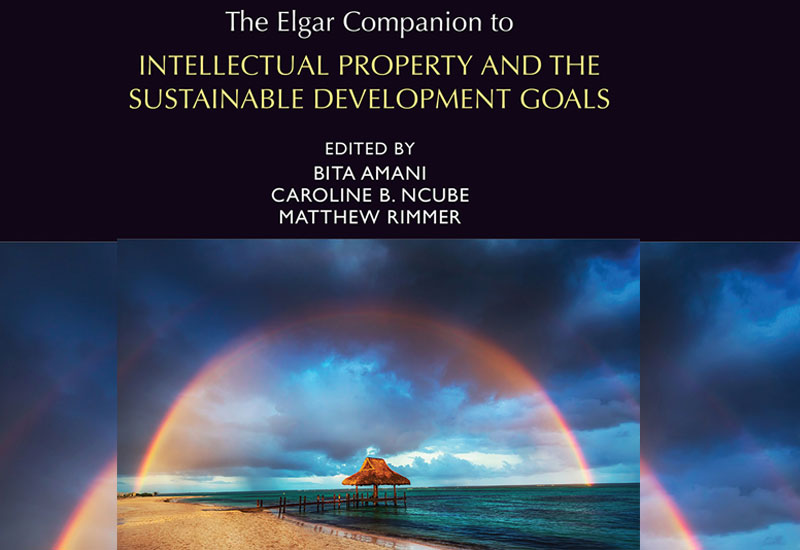Intellectual property – a tool for achieving the UN SDGs
26 April 2024 | Story Nicole Forrest. Read time 7 min.
In the intellectual property (IP) volume, The Elgar Companion to Intellectual Property and the Sustainable Development Goals, IP experts from around the world provide a thorough examination of the interaction between this field of law and the achievement of the United Nations (UN) Sustainable Development Goals (SDGs).
In observation of World Intellectual Property Day, UCT News delved into this groundbreaking volume that is the result of work by more than 30 scholars, including the holder of the South African Research Chair in Intellectual Property, Innovation and Development at the University of Cape Town (UCT), Professor Caroline Ncube.
The 17 SDGs and their associated 169 targets provide a framework for ending poverty. Despite this massive opportunity, we find ourselves just 15% of the way to achieving these goals and targets. This slow progress can, in part, be attributed to the fact that technology and the benefits associated with it are not evenly distributed across the globe.
Technological innovation is a key for economic growth and therefore achieving the SDGs. However, the mechanisms that drive this development are complex and have far-reaching impacts on various areas of social and economic importance.
“There has never been a comprehensive look at all 17 of the SDGs in the light of IP.”
While many have expressed their positions around whether the protection of IP rights is a help or a hindrance towards achieving the SDGs, there has not to this point been a comprehensive look at the interplay between IP and each of the SDGs.
This, according to Professor Ncube, was the impetus behind the creation of The Elgar Companion. “The idea is that there are very clear linkages between IP and the SDGs, but there has never been a comprehensive look at all 17 of the SDGs in the light of IP. So, the idea was to create this substantial volume that deals with this topic,” she said.
Amplifying African perspectives
Ncube explained that she and her co-editors, Professor Matthew Rimmer (Queensland University of Technology, Australia) and Dr Bita Amani (Queen’s University, Canada), focused on featuring the thought leaders in IP and producing a balanced volume in terms of geographical coverage, subject matter expertise and gender parity.
Considering the list of authors, she said, it’s unsurprising that many of the chapter authors are African. “We sat down and figured out our ‘dream team’, if you will. This included leading voices in the area as well as emerging voices that aren’t necessarily heard enough.
“Taking this approach, it’s no surprise that we have many African scholars contributing to this volume because a lot of work is happening on the African continent with regard to intellectual property.”
The importance of giving a voice to Africa-focused scholars cannot be understated in light of IP’s potential to level the playing field between the Global North and Global South to at least some degree, noted Dr Desmond Oriakhogba, a contributor to The Elgar Companion and senior lecturer in the Department of Private Law at the University of the Western Cape.
“Whoever controls the knowledge space – the global knowledge economy – controls what is happening in the world,” he said.
“Whoever controls the knowledge space – the global knowledge economy – controls what is happening in the world.”
“So, the one way that Africans can gain a stronger position in the knowledge economy is by developing their IP through enabling laws that will ensure that innovations themselves are a nest for the benefit of Africans and for the benefit of Africa.
“Looking at it from this angle, nobody can better tell the story of the interaction between IP and the SDGs than those who are living that story. This is why African experts are in the best position to lay out how they are affected by these global issues and to provide solutions that will be most effective for solving those problems,” he added.
Ncube agreed on this point. “A context-immersed scholar is the best scholar to talk about their context. So, it’s important that we have African scholars be the agents and writers of this research,” she said.
Rethinking IP for sustainable progress
By bringing together voices from the African continent and diaspora, the volume shines the light on a variety of promising proposals that have the power to realign and reform intellectual property law, policy and practices to better promote the SDGs.
In this vein, Ncube highlights that we need policy shifts in IP that promote cooperation over competition to succeed in creating better outcomes for all.
“The SDGs are about inclusion and working together towards global solutions, but IP is the opposite. It’s about exclusion; asserting your own rights and protecting those above all else. They’re diametrically opposed.

“In my chapter, I argue that for IP to really contribute to the attainment of the SDGs, we need a policy reorientation. We need to think about IP in light of human rights. There needs to be more careful consideration about when people weaponise or de-weaponise IP and how that can help us achieve these goals,” she said.
Professor Lonias Ndlovu, who co-authored the chapter focusing on how improving access to educational materials can support SDG 4 alongside Dr Oriakhogba, agreed on this point. He noted that to provide the quality education necessary to drive progress and innovation, we must consider restructuring copyright law.
“Some of the most promising proposals for realigning IP law, policy and practices to better promote SDGs include law reform; the use of innovation models such as open-source software and open access publishing; equitable access to IP processes and products; and leveraging technology transfer and capacity building,” said the director of the University of Venda’s School of Law.
“For example, focusing on fair dealing, as it’s provided for in section 12 of the South African Copyright Act, and open access. This allows for the use of copyrighted works without permission from the copyright holder under specified circumstances.
On the other hand, open access promotes access to educational resources by making scholarly research and other works freely available online. These concepts share the common goal of promoting access to and use of copyrighted works, thus aiding and abetting quality education,” he added.
Given these potentially massive impacts of IP reform, The Elgar Companion becomes an essential read for those looking to understand how we can use innovation in its many forms to create a more equitable world.
A virtual book launch was hosted at UCT on 22 April, with a keynote address by Edward Kwakwa, the assistant director general of the World Intellectual Property Organization.
 This work is licensed under a Creative Commons Attribution-NoDerivatives 4.0 International License.
This work is licensed under a Creative Commons Attribution-NoDerivatives 4.0 International License.
Please view the republishing articles page for more information.










